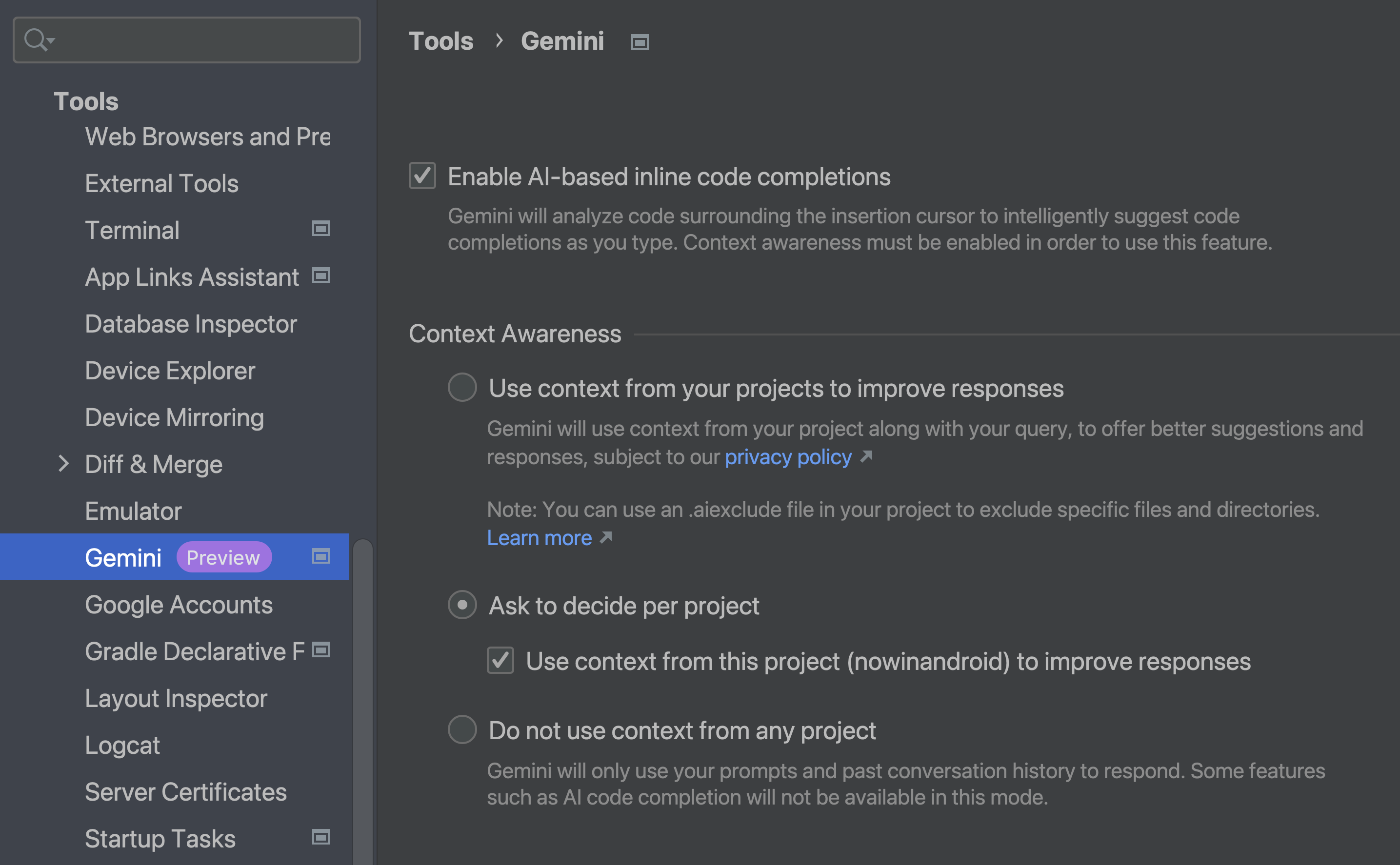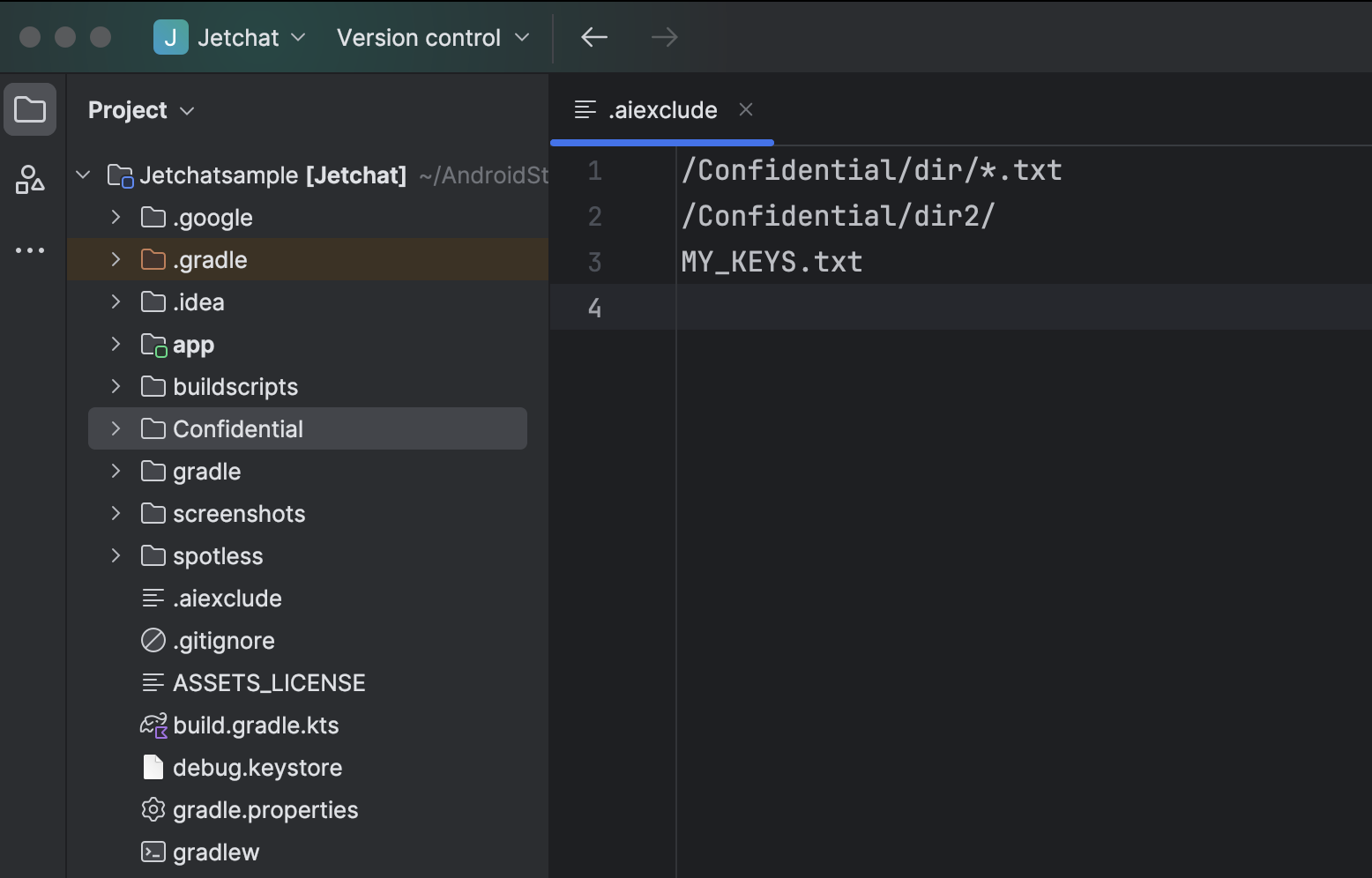Gemini in Android Studio は、プライバシーを重視して構築されています。
Google は、コードのプライバシーを確認することが、デベロッパーの信頼を獲得し維持するうえで重要であることを理解しています。Gemini in Android Studio は、ユーザーの同意なしにコードがパソコンから離れないように設計されています。コード コンテキストを指定すると、Gemini はその追加のコンテキストを使用して、質問に的確に回答します。共有するデータはユーザーが完全に管理できます。
Google では、信頼は透明性から生まれると考えています。このページでは、データの使用方法を管理するための AI に関する取り組み、トレーニングの理念、技術的な制御について説明します。
Google の保証
Gemini は、Google の AI に関する原則を念頭に置いて構築されています。これらの原則は、AI テクノロジーを責任を持って開発するという Google の取り組みを表すものです。
- Android Studio で Gemini を使用すると、Google は プライバシー ポリシーと Gemini のプライバシーに関するお知らせに沿ってデータを処理します。
- Gemini Code Assist に登録して Gemini in Android Studio for businesses を使用する場合、Google は Google Cloud のプライバシーに関するお知らせに従ってデータを処理します。
データの収集と使用
お客様の明示的な同意なしに、コードが Gemini と共有されることはありません。コンテキスト認識機能を有効にするために、コードを Gemini と共有できます。これにより、Gemini はプロジェクト固有のレスポンスを提供できるようになります。
データの収集と使用は、次のように行われる可能性があります。
- 高評価 / 低評価シグナルなどのフィードバック データは、Gemini のトレーニングに使用されることがあります。
- 個人向けの Gemini in Android Studio を使用している場合、チャット エクスペリエンスに明示的に入力したコードは Gemini のトレーニングに使用されることがあります。コンテキスト認識を有効にすると、収集された情報(コードを含む)が、機械学習技術などの Google のプロダクトやサービスの改善に使用されることがあります。詳しくは、Google のプライバシーに関するお知らせをご覧ください。
- 企業向けの Gemini in Android Studio を使用している場合、チャット エクスペリエンスに入力したコードは Gemini のトレーニングに使用されることはありません。コンテキスト認識を有効にすると、収集された情報(コードを含む)が、機械学習技術などの Google のプロダクトやサービスの改善に使用されることはありません。詳細については、Google Cloud のプライバシーに関するお知らせをご覧ください。
AI コード補完機能を使用することを選択した場合、Google はコードベースのコンテキストを使用して、より質の高い回答を提供します。
コンテキスト認識機能を無効にして Gemini を使用できます。ただし、機能の精度が低下し、ML を活用したコード補完などの一部の機能が無効になります。Android Studio には、[File](macOS では [Android Studio])> [Settings] > [Tools] > [Gemini] を使用して、有効にするコンテキスト認識のレベルを調整するためのプライバシー管理機能が組み込まれています。コードベースの特定の部分でコンテキストの共有をブロックするには、.aiexclude ファイルを使用してコンテキストの共有を構成するをご覧ください。
データは、Google がその提供者を判別できない方法で保存されるため、リクエストに応じて削除することはできません。データは最長で 18 か月間保持されます。詳しくは、Gemini のプライバシーに関するお知らせをご覧ください。
送信および受信するデータ
Gemini に送信されるデータと Gemini から受信されるデータには、次の種類があります。
- 使用統計情報
- Android Studio とその関連ツール(機能の使用方法やリソースの使用状況など)の使用方法を指定するデータ。これには、パッケージ名、クラス名、プラグイン構成など、Studio 内部のソフトウェア ID が含まれます。この共有は、[File](macOS の場合は [Android Studio])> [Settings] > [Appearance & Behavior] > [Data Sharing] で有効または無効にできます。
- プロンプトと回答
- Gemini に尋ねる質問(Gemini に送信して分析または完成される入力情報やコードなど)は、プロンプトと呼ばれます。Gemini から受け取る回答やコード補完は、レスポンスと呼ばれます。
- フィードバック シグナル
- 高評価と低評価の投票、およびお客様から提供されたその他のフィードバック。
- コンテキスト(省略可)
- Gemini は、コードの一部、ファイルタイプ、大規模言語モデル(LLM)にコンテキストを提供するために必要なその他の情報など、コードベースから追加情報を送信する場合があります。これにより、Gemini はより高品質で関連性の高い回答を提供できます。これにより、Gemini は AI コード補完などの追加の試験運用機能も提供できます。
デベロッパーの選択肢
デフォルトでは、Gemini はエディタ ウィンドウのコードを認識できず、チャットボットのプロンプトと会話履歴のみを使用して応答します。ただし、コードベースのコンテキストを共有して、回答の品質を高め、AI コード補完などの試験運用版機能にアクセスすることは可能です。
Gemini にコンテキストを提供するためにプロジェクトのソースコードの共有を制御するメカニズムは 3 つあります。

全般設定
Studio には、[File](macOS では [Android Studio])> [Settings] > [Tools] > [Gemini] にグローバル オプトイン設定があり、コンテキスト認識を提供するためにソースコードを Gemini サーバーに送信するかどうかを指定できます。
![Android Studio の [Enable Gemini context awareness for this project?] ダイアログ ボックス。](https://developer.android.com/static/studio/gemini/images/project-confirmation.png?authuser=5&hl=ja)
プロジェクト固有の設定
Studio の Gemini 設定で [プロジェクトごとに決定するよう求める] が選択されている場合、各プロジェクトを初めて開くときに、そのプロジェクトでコンテキスト認識を有効にするかどうかを尋ねるダイアログが表示されます。この設定は、プロジェクトの .idea ディレクトリに保存されます。

.aiexclude ファイルによるソースコードの制限
.aiexclude ファイルをプロジェクトのソースコード ディレクトリに追加すると、AI モデルのコンテキストとして使用できるファイルをより細かく制御できます。
